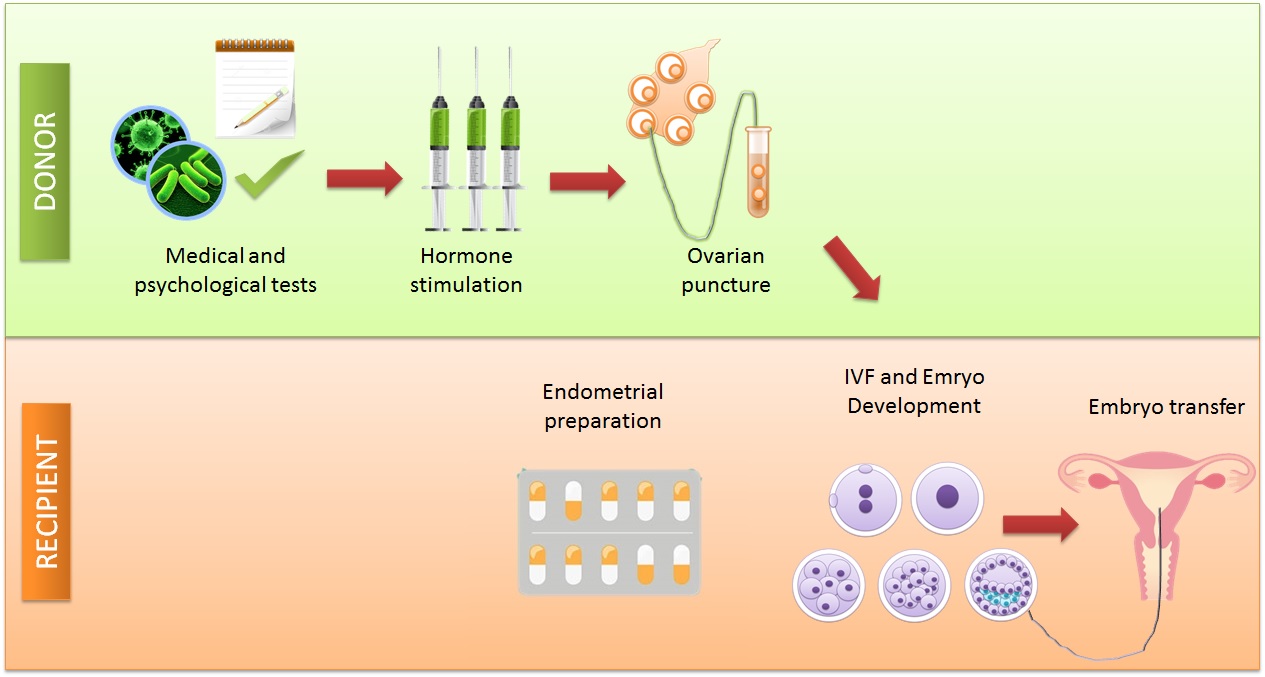Have you ever thought about donating eggs? Whether you have raised it or not, on this post we explain how the donation of eggs is made. Donating eggs is not a painful process, but it is longer and more complex than donating semen.
What is the process of donating eggs?
The donation process begins with the personal interview in the Fertility Unit. In this way, you enter in the selection of donors. After the interviews, a gynecological appointment is arranged, in which the donor undergoes a series of routine tests (gynecological examination, cytology, microbiological cultures, serologies, general biochemical analyzes and genetic tests).
If the results of the tests are not pathological and everything is normal, the donor is admitted to be able to initiate the hormonal stimulation.
The hormonal stimulation of ovulation consists of a series of injections applied subcutaneously. With this medication, the ovarian follicles grow and mature a large number of eggs. During the stimulation, several ultrasound controls are performed in order to check the development of the follicles, and finally, when this process is completed, ovarian puncture is performed.
In ovarian puncture the eggs are collected for freezing or, generally, for using them on a cycle of in vitro fertilization (IVF) of a recipient.
What characteristics should donors have?
As we have said before, medical tests are done to donors to check that they do not have any infection or disease, and even that they do not have serious genetic alterations. In addition, donors must be over 18 years of age and not over 35; They can not have malformations, genetic or congenital or hereditary diseases (close relatives can not suffer from these diseases either); And, obviously, they must have a normal ovulatory function.
In general donors should be in perfect health, both physically and mentally.
What are the risks of donating eggs?
The possible risks, although they are not frequent, are explained to the donors and they are collected in the informed consent that the donor has to sign at the beginning of the treatment. The process is not as dangerous as there are serious health consequences, but it is important that the donor is aware of the possible symptoms in order to avoid the syndrome of ovarian hyperstimulation.
Why donate eggs?
Many people see donating eggs as a way to make money. However, the donation process is altruistic and what is received is an economic compensation for the discomfort suffered and the possible risks.
What is really important is that there are many women who, for different reasons, do not have eggs capable of giving birth to an embryo, so the only chance of getting pregnant is in egg donation. Therefore, the greatest possible reward for a donor is to be able to help another person to have a child.
FAQ ABOUT EGG DONATION
¿Causan molestias la estimulación y la punción ovárica? Durante la estimulación ovárica puede notarse una sensación de hinchazón abdominal debido al aumento de tamaño de los ovarios. Tras la extracción de los óvulos, estos síntomas desaparecen en pocos días.
Does egg donation affect donor fertility? Although there are some people who may believe that this process will affect their own fertility, donating eggs does not mean that your egg supply is depleted.
Is there a limit to the number of egg donations? In Spain the limit that exists, according to Law 14/2006 of Assisted Reproduction, is a maximum number of six children born in the country from the same donor, including the own children of the donor. In other countries this figure may vary.
Is egg donation anonymous? Due to Spanish legislation, the donation must be anonymous for both the donor and the receiving couple.
Can I have sex during the process? It is not recommended to have sex during treatment, in order to avoid the risk of multiple pregnancy of the donor, among other things.
How is the donor synchronized with the recipient of the eggs? Before treatment, anovulatory (contraceptive) may be prescribed to the donor, which should be taken until the menstrual cycle is synchronized with the recipient’s cycle. Subsequently, during the stimulation of the donor, the recipient is also given hormones in order to prepare her endometrium for future pregnancy.
We hope that the possible doubts about the process of egg donation have become clearer and that many women join this initiative. Donating eggs is donating life.
Phi Fertility
C. Orjuela, Embryologist.
Contact us.
Vithas Perpetuo Internacional. Plaza del Doctor Gómez Ulla 15, Alicante.
Phone number: 965230397 / +34 606437458
Email: info@phifertlity.com
You can follow our publications and news through our social networks: Facebook and Twitter.




